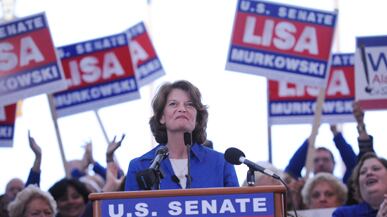Lisa Murkowski’s write-in victory proves it: If a party’s tiny primary electorate backs a wingnut, good candidates should keep going, and trust the will of the voters. By Tunku Varadarajan
Lisa Murkowski has at long last taken Alaska’s Senate seat—wresting it from the grasp of Joe Miller, the official Republican candidate who was propelled onto the ballot in the state’s primaries by an energetic heave from the state’s Tea Party activists.
So: Sarah Palin’s handpicked candidate has been defeated by the state’s handwritten alternative. Conservatives were (and are) inclined to say that Murkowski, the “write-in,” was anything but right on for taking on the Republican Party’s own man. But I’m inclined to disagree vigorously, and to declare my support for the Murkowski Model: Don’t take, lying down, a mugging in the primaries. Don’t retreat; reload.
Alaska, like too many other states in the Union, has closed primaries. These frequently low-turnout affairs are susceptible to hijacking by determined voter-activists, who foist on the general electorate candidates that are often far outside the mainstream. For the GOP, this can yield disastrous outcomes: Witness the Senate election in Delaware, and the governor’s race in New York, in both of which the Republican Party ran candidates who were ideologically “pure” (by the application of the crudest shibboleths) and yet utterly unelectable. (My colleague, John Avlon, crunched some eye-opening primary numbers in a recent piece for the Beast.)
The way to fight a drive for ideological purity (as defined by the activists) is, simply, to keep going, flouting the activists’ will and presenting the electorate with more choice. Anything that busts up complacency and cozy settled arrangements is welcome. Ralph Nader is a good thing, as are the Buchanans and Perots as third-party candidates.

The Tea Party, too, is a welcome force in our politics—jolting the establishment out of the inertia of its assumptions, challenging party machines and making lobbyists quiver. That said, why not fight back—as Murkowski did—when an activist-driven primary gets it wrong? The write-in device is truly excellent, and literally democratic, if one may put it that way, since it involves writing ( and spelling).
If primaries don’t matter, why have them? They should matter when they work, but shouldn’t when they don’t.
Murkowski’s remarkable success raises a broader question: When a closed primary moves a party demonstrably to its wings, should mainstream candidates refuse to accept the primary’s verdict? Should Mike Castle, the highly electable Delaware Republican who lost to Christine O’Donnell in the GOP primary, have “done a Murkowski” and run against the party’s candidate (making clear, of course, his intent to caucus with the Republicans in the Senate)?
This is where matters get complicated.
One cannot possibly dislike the idea of giving voters more choices. But can one draw any hard conclusions from the Murkowski campaign? The replicability of her model would depend on local political conditions and traditions. For one, the primary race has to be close. If the gap between winner and loser is an enormous chasm (as it was when Bob Bennett was bounced in the Utah GOP primary), an independent run by the emphatic loser would look politically—almost aesthetically—unbecoming, even indefensible.
To judge by the two most recent times an intra-party challenger has gone independent and successfully taken on the party’s own candidate—Joe Lieberman and 2006 and Murkowski in 2010—a necessary condition for the primary loser to emerge as the general election winner is that the other major-party candidate (the Republican in Lieberman’s case and the Democrat in Murkowski’s) be essentially a dead-ender.
That condition was absent in Delaware, a heavily Democratic state where the Democratic candidate, Chris Coons, was a perfectly plausible candidate—as it was in Nevada, Colorado, and Connecticut, other states in which Tea Party candidates took the GOP primaries. (Bob Bennett in Utah, arguably, might have been successful had he run as a write-in; but his early elimination in the primary crushed his spirit altogether, as well as subjecting him to the “optics” argument I made above). It also helps if your party opponent is seriously flawed (as Joe Miller, detainer of pesky journalists, proved himself to be). If he isn’t—as was the case with Marco Rubio, who was, in fact, seriously good—a challenge run is unlikely to succeed. (Adios, Charlie Crist.)
There are those who will argue—and they may well have a point—that the Lieberman and Murkowski cases are quite different. Lieberman made an important stand for principle in taking on Ned Lamont (his principle being support for the war in Iraq). Could one say the same about Murkowski, whom many Republicans accuse of acting in naked self-interest? My own view is that while her personal ambition cannot be denied—and might even be said to be naked—there was, in fact, a muscular principle at work: that of saying no to ideological extremism.
There is, of course, an overarching philosophical question: If primaries don’t matter, why have them? To which the straight (but not necessarily trite) answer would be: They should matter when they work, but shouldn’t when they don’t. If a politician asserts that a primary hasn’t worked, he or she can take the matter to the electorate—which is the body of voters empowered to deliver the only verdict that truly counts.
Tunku Varadarajan is a national affairs correspondent and writer at large for The Daily Beast. He is also the Virginia Hobbs Carpenter Fellow in Journalism at Stanford's Hoover Institution and a professor at NYU's Stern Business School. He is a former assistant managing editor at The Wall Street Journal. (Follow him on Twitter here.)




